20 tips for 2020: Mistakes to avoid
- ESET Expert

- Jan 1, 2020
- 4 min read
In the first installment of this two-article series we will be looking at cybersecurity habits to avoid when using your computing devices

As we’re entering 2020, we’re also plotting out our New Year’s resolutions. Instead of suggesting what you should do next year, however, let’s have a look at some cybersecurity mistakes you should avoid for a more secure 2020.
Denying you are a target
You’ve probably already brushed off this possibility with contempt, thinking the chances are slim to none. To quote Dwight from The Office, “False”. When it comes to the internet, you cannot anticipate if a breach will directly affect you. New malware may appear or a service that you use may get hacked and your password can be leaked. All of these are probabilities that you should be aware of, and prevention can go a long way in securing your connected presence.
Clicking on suspicious links
Receiving spam has become a part of everyday life. Sometimes it’s just a harmless ad, but every now and then it can be something more sinister. You might get an email coaxing you to click on a suspicious link to claim a prize you’ve won. Or an offer that sounds too good to pass up might appear in an ad. Whatever the case, if you have even a shred of doubt about it: avoid clicking on it at all costs. The link just may contain malware that may wreak all kinds of havoc on your computer.
Failing to patch
Is your computer nagging you for the umpteenth time to install that pesky update? Perhaps the latest patch for your smartphone’s OS has been released. You’ve probably hit the postpone button more times than you’ve snoozed your alarm. We can’t speak to your sleeping habits, but you should always keep your devices updated to the latest version of software available. It will probably save you from a headache in the long run. The infamous WannaCryptor malware spread due to devices not being patched.
Recycling your passwords
To simplify the arduous task of memorizing scores of passwords, some people resort to recycling. This means that they reuse the same password or passphrase, perhaps varying a character or two or by adding upon it. This practice should be avoided. If the bad actors figure out one of your passwords, password reuse allows them to guess the rest of your passwords.
Not using 2FA
Two-factor authentication (2FA), also known as multifactor authentication (MFA), is a simple way to add an extra layer of security to your accounts. The most common 2FA method used by popular online services is a text message with an authentication code sent to your phone. It is one of the most basic methods but use at least this one if you have no other option. If bad actors are missing one piece of the puzzle, they cannot get in until they overcome that hurdle, which might make them look for an easier challenge elsewhere.
Ignoring your router setup
When it comes to home interconnectivity, the router is the heart of your home. All your devices with an internet connection are linked to it, be it your smart TV, smartphone, personal computer or laptop. For convenience’s sake, a lot of people just go through the bare necessities when installing it or keep the default settings pre-configured by your ISP. You should always take steps to secure your router, so you can browse the internet safely.
Using unsecured public Wi-Fi
Most places like cafes, restaurants, and even shops offer complimentary Wi-Fi connections, which is a welcome alternative to using up your precious data plan. As convenient as such free connections might be, you should be careful what you connect to. An unsecured public Wi-Fi can lead to your private data being stolen or your device being hacked.
Disregarding VPN
Besides using a Virtual Private Network (VPN) to connect to your work’s servers, there are other security reasons to use one in private. You can use VPNs to access your home network remotely or to limit your ISP from seeing what you are doing, or to browse safely on public Wi-Fi. Depending on what you want to do, there are various types of VPNs you can choose from to protect your communication.
Skimping on security software
The internet is a useful tool, no doubt, but to paraphrase G.R.R. Martin, it can be dark and full of terrors. Granted, this leans towards hyperbole, but you should always use reputable security software to protect your data. Clicking on the wrong link might lead to malicious code making its way to your computer. Security software provides multiple layers that can stop these threats in their tracks. Prevention is the mother of security; athletes in contact sports use mouthguards as a preventive measure because fixing their teeth is more expensive than protecting them. The same goes for your data.
Underestimating backup and encryption
If, due to some unforeseen circumstances, your computer kicks the can, having a backup comes in handy. Always back up your sensitive data and things you have been working on recently; thus, if something does happen, you can continue unhindered by the unfortunate loss of your device. The same goes for encryption. Never underestimate the value of having your data encrypted: if you get hacked, the bad actor will have a tough time getting to your data; if your device gets stolen, you have an extra layer of security in place before you remotely wipe it.
If you just counted ten tips and not twenty, you would be right. We have it in another article- tips that will be geared towards smartphones.



Comments